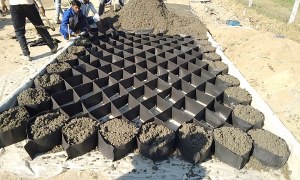🕑 Reading time: 1 minute
Coarse aggregates have properties such as size, shape, moisture contents, specific gravity, density etc. which affects concrete strength and durability in many ways. These effect of aggregate properties on concrete are discussed in detail. Concrete is a mixture of cementitious material, aggregate and water. Aggregate is commonly considered inert filler, which accounts for 60 to 80% of the volume and 70 to 85% of the weight of the concrete. Although aggregate is considered inert filler, it is a necessary component that defines the concrete’s thermal and elastic properties and dimensional stability. Physical and mineralogical properties of aggregate must be known before mixing concrete to obtain a desirable mixture. These properties include shape and texture, size gradation, moisture content, specific gravity, reactivity, soundness, and bulk unit weight. These properties along with water /cementitious material ratio determine the strength, workability and durability of the concrete.
The shape and texture of the aggregate affects the properties of fresh concrete more than hardened concrete. Concrete is more workable when smooth and rounded aggregate is used instead of rough angular or elongated aggregate.
Crushed stone produces much more angular and elongated aggregate, which have a higher surface to volume ratio better bond characteristics but require more cement paste to produce a workable mixture.
The surface texture of the aggregate can be either smooth or rough. A smooth surface can improve workability yet a rougher surface generates a stronger bond between the paste and the aggregate creating a higher strength.
The grading or size distribution of aggregate is an important characteristic because it determines the paste requirement for workable concrete. The required amount of the concrete paste is dependent upon the amount of void space that must be filled and the total surface area that must be covered.
When the particles are of uniform size the spacing is the greatest but when a range of sizes is used the void spaces are filled, the less workable the concrete becomes, therefore, a compromise between workability and economy is necessary.
The moisture content of an aggregate is an important factor when developing the proper water/cementitious material ratio.
The density of the aggregate is required in mixture proportioning to establish weight- volume relationships.
Read More:
Properties of Building Materials and their Importance in Construction
Factors Affecting Strength of Concrete
Health Issues with Building Materials During and After Construction
Types of Flooring Materials and Their Applications in Building Construction
Physical and mineralogical properties of aggregate must be known before mixing concrete to obtain a desirable mixture. These properties include shape and texture, size gradation, moisture content, specific gravity, reactivity, soundness, and bulk unit weight. These properties along with water /cementitious material ratio determine the strength, workability and durability of the concrete.
The shape and texture of the aggregate affects the properties of fresh concrete more than hardened concrete. Concrete is more workable when smooth and rounded aggregate is used instead of rough angular or elongated aggregate.
Crushed stone produces much more angular and elongated aggregate, which have a higher surface to volume ratio better bond characteristics but require more cement paste to produce a workable mixture.
The surface texture of the aggregate can be either smooth or rough. A smooth surface can improve workability yet a rougher surface generates a stronger bond between the paste and the aggregate creating a higher strength.
The grading or size distribution of aggregate is an important characteristic because it determines the paste requirement for workable concrete. The required amount of the concrete paste is dependent upon the amount of void space that must be filled and the total surface area that must be covered.
When the particles are of uniform size the spacing is the greatest but when a range of sizes is used the void spaces are filled, the less workable the concrete becomes, therefore, a compromise between workability and economy is necessary.
The moisture content of an aggregate is an important factor when developing the proper water/cementitious material ratio.
The density of the aggregate is required in mixture proportioning to establish weight- volume relationships.
Read More:
Properties of Building Materials and their Importance in Construction
Factors Affecting Strength of Concrete
Health Issues with Building Materials During and After Construction
Types of Flooring Materials and Their Applications in Building Construction 

